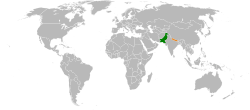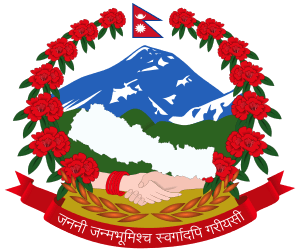Nepal–Pakistan relations
 |
|
Pakistan |
Nepal |
|---|---|
Nepal–Pakistan relations are the bilateral relations between the Federal Democratic Republic of Nepal and the Islamic Republic of Pakistan. Nepal and Pakistan established diplomatic relations on 29 March 1960.[1] These relations were fully established between 1962 and 1963,[2] both nations have since sought to expand trade, strategic and military cooperation. The connections were severed in 1972 followed by Nepal's recognition of Bangladesh,[3] but were later re-established.
Background
Nepal established diplomatic relations with India after the latter's independence in 1947, but did not do so with Pakistan. In 1950, Nepal signed a Treaty of Peace and Friendship with India, creating an extensive relationship of economic, strategic and defence cooperation. Nepal thus remained aloof from Pakistan, which was at conflict with India.[4][5][6] However, Nepal's resentment of Indian influence perceived to be excessive prompted the Nepalese government to develop relations with the People's Republic of China and Pakistan.[6][7][8]
Development of bilateral relations
Nepal and Pakistan signed a protocol for establishing diplomatic relations in 1962. They exchanged ambassadors and set up embassies in 1963, when Ayub Khan, the President of Pakistan made a special visit to Nepal.[2] Both nations also signed agreements to reciprocate the "Most Favored Nation" status of importance for developing trade and cooperation.[2] In 1963, Pakistan agreed to provide Nepal with free trade access and transport facilities through the port of Chittagong in East Pakistan (now Bangladesh) and established an air link. This arrangement reduced Nepal's dependence on India for trading privileges.[2] Although Nepal officially maintained neutrality during the Indo-Pakistani War of 1971, it was one of the first to recognise the independence of Bangladesh. As a retaliation, Islamabad severed ties with Kathmandu two days later.[3]
Defence Cooperation
In recent years, both countries began developing military cooperation, with Nepal importing arms from Pakistan.[9] Condemned and isolated from India, Great Britain and the United States between 2004 and 2006 for repressing democracy, the Nepalese monarchy developed military cooperation with China and Pakistan, who offered extensive military support, arms and military equipment to Nepal for the monarchy to stay in power and fight the Maoist insurgency.[9][10] Both Pakistan and China have provided medium-tech weapons to Nepal.
Bilateral trade
Despite an extensive 1982 trade agreement, the volume of bilateral trade remains comparatively small at USD 4.8 million.[11] Pakistan's total exports to Nepal are worth USD 1.631 million while Nepal's exports to Pakistan tally USD 3.166 million.[11] Both countries have recently stepped up efforts to promote bilateral trade, especially in textiles, oilseeds, extraction of oil and tourism; Pakistan also offered a USD 5 million line of credit to Nepal.[10][11][12] Nepal and Pakistan are signatories to the South Asia Free Trade Agreement (SAFTA) and members of the South Asian Economic Union.
FNCCI-FPCCI Joint Business Council
The Federation of Nepalese Chambers of Commerce and Industry and the Federation of Pakistan Chambers of Commerce and Industry have established FNCCI-FPCCI Joint Business Council. Its meetings provides opportunities for the business communities of the two countries to meet and discuss business opportunities in each other's countries.
Pakistan Technical Assistance Programme
Pakistan has been providing 15 scholarships annually to Nepalese students under Pakistan Technical Assistance Programme in medicine, dentistry, pharmacy and engineering. Besides, some Nepalese students have been studying in the areas of humanities and business administration on self-finance basis. Pakistan has also provided short-term and long-term trainings to Nepal Army officers.[1]
Pakistan support for the democratic process
Politically, Nepal and Pakistan have remained good friends over the decades. Pakistan has extended its support for the democratic process in Nepal, after the successful People's Movement-II. Pakistan welcomed the restoration of Nepal's parliament following the popular movement and hoped that the breakthrough would usher in an era of durable peace and prosperity in Nepal. Pakistan has been reiterating its support for Nepal's sovereignty, territorial integrity and peaceful development.[1]
See also
References
- 1 2 3 http://www.nepalembassy.pk/relations.html
- 1 2 3 4 Nepal - Pakistan relations
- 1 2 "Nepal - Pakistan and Bangladesh". U.S. Library of Congress. Retrieved 9 July 2011.
- ↑ Tribune India
- ↑ Dick Hodder, Sarah J. Lloyd, Keith Stanley McLachlan. Land-locked States of Africa and Asia. page 177. Routledge, 1998. ISBN 0-7146-4829-9
- 1 2 India-Nepal Treaty
- ↑ Nepal's China-Card
- ↑ Sino-Nepalese relations
- 1 2 Nepal gov't procuring military articles from China, Pakistan
- 1 2 Nepal, Pakistan in economy talks
- 1 2 3 Pakistan and Nepal bilateral trade to be improved
- ↑ China brings Nepal friendship, not arms

